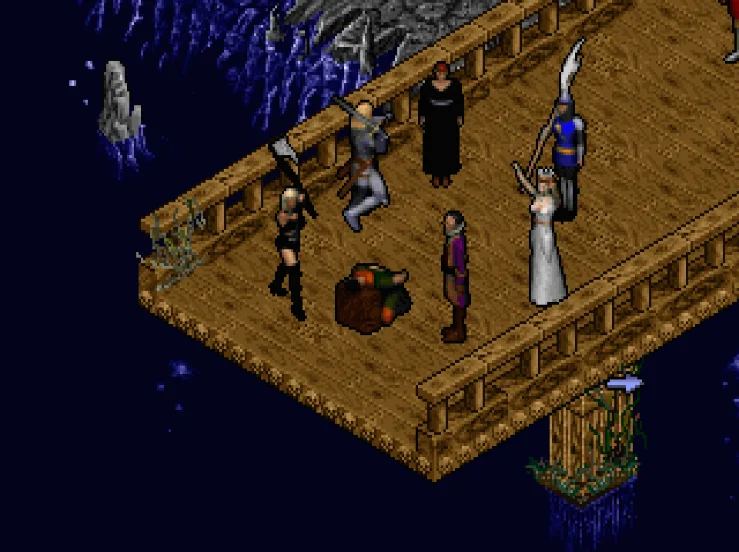Heroes and Villainy - Ultima 8: Pagan
Ultima, as a franchise, has done more to influence modern gaming than most people realize. I think this is mainly attributable to its sadly troubled history, particularly the turbulent time when Origin systems - the incredible studio that churned out classics like Wing Commander and Crusader: No Remorse - was bought up and slowly gutted over a decade by Electronic Arts. Indeed, I don't think love of Origin is felt in the gaming community quite so much as hatred for EA. Yet the mark of Ultima is undeniable. One could point solely to Richard Garriott coining the term "MMORPG" with Ultima Online as proof positive of the franchise's legacy, but for me the true mark of the games lies in their individual contributions to fantasy storytelling and gameplay. The complexity of the stories went far beyond the simple hack-and-slash plots of the time, delving into moral grey areas in a manner I had never seen before. For me, one of the best examples of this - and this will probably cause friction amongst the Ultima faithful - is Ultima 8: Pagan.
Let's get one thing straight. Ultima 8 is not a great game. Many would say it is not even a good game. Still others would say it is an awful game, and the beginning of the end of all that made Ultima what it was. But gosh darnit, there's part of me that just loves this game, broken platforming, unfinished plotlines, abandoned expansion and all.
It's hard to condense the story of Ultima's sprawling world into a few choice sentences, but I'll give it a crack. To begin with, the preceding games feature the adventures of The Avatar, the player character, drawn from Earth by mysterious forces to Britannia, a land of high fantasy. Over his various adventures, The Avatar conquers evil wizards, battles demons, and ascends to become the Christ-like figure of Britannia's "Age of Enlightment," a period of time governed by a set of spiritual beliefs in eight virtues. However, just at the peak of their powers, The Avatar is confronted by a new threat, The Guardian, and, following the events of Ultima 7 Part 2: The Serpent Isle, is cast into another world, the eponymous Pagan.
Pagan is a world that The Guardian has already conquered. It was at one time a prosperous world, ruled by a mighty people known as the Zealans. Then the Guardian came, and convinced the people that an evil god known as "The Destroyer" was en route to their world, and their only salvation lay in worshipping four Titans, each representing one of the four elements. The truth, however, is that the Destroyer and the Guardian are one and the same, and the Titans are mere minions empowered by the fear-induced faith of their "Pagan" worshippers, who annihilated the Zealans in a bloody war. Upon arriving on Pagan, the Avatar sets out to master all four elements of the world, becoming a Titan themselves, a Titan of Ether. However, they must first contend with the hateful, bitter inhabitants of Pagan, people twisted by generations of living under the cruelty of the Titans. Indeed, one of the first scenes you see in the game is the callous execution of a local shopkeeper.
Although Ultima has a long, storied history flirting with dark fantasy (Ultima 5: Warriors of Destiny and Ultima 7 Part 2: The Serpent Isle, are particularly good examples of this), Pagan was the first game that dove into the darkness head first. Pagan is a world of literal darkness; a sorcerer summons the fire Titan Pyros (AKA THE DEVIL) just to ask him what the Sun is. The "good" people in this game, unlike previous instalments, are few and far between. The box art is a burning pentagram for crissakes. And the choices and path you are forced to take are unlike anything you've ever seen.
In Ultima 8, you take part in blood sacrifices, witness suicides, and directly contribute to and even commit several murders, and all the while your progress against the Titans is marked by devastating storms, volcanic eruptions, and earthquakes. There is a definite impression that you are doing more harm than good by exposing the lies of the Titans, annihilating a power structure and society that, although cruel, has provided stability to an entire world. Furthermore, you aren't doing any of this out of the goodness of your heart; you're doing it to get home. Every action The Avatar takes in Ultima 8 is for that single-minded purpose. In fairness, you know better than anyone the devastation that is happening in your absence as The Guardian assaults Britannia, but does that really forgive you causing such suffering on an entirely different world?
I have read and heard many opinions from people I respect that Ultima 8 is a deeply flawed game, and I do agree. Most negative reviews have centered on the brutal control scheme, the annoyingly complex magic system, and the frankly gaping holes in the design (thanks EA!). For me though, the real flaw in Ultima 8 is the unanswered philosophical question that lies at the heart of the game: do the ends justify the means? Is the sacrifice of an entire world's happiness and peoples in the pursuit of saving all worlds acceptable? Do the needs of the many, as Mr. Spock says, outweigh the needs of the few?
Sadly, thanks to cutbacks, we never really find out. But I still really enjoy Ultima 8 for raising the point at all, and in 1994 that was a big deal. Other RPGs of the same time did have a measure of complexity to them - Final Fantasy VI for example - but they were still fairly obvious in their depictions of right and wrong (Kefka is not what I would call "complex"). Ultima 8 dared to make the hero a villain. And God help me, I loved it.




